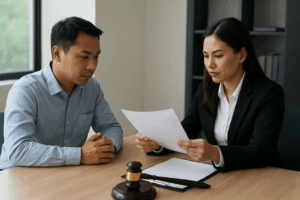Thailand, a popular destination for expatriates and travelers alike, boasts a rich cultural tapestry and breathtaking landscapes. However, navigating the country’s visa regulations is crucial to ensure a smooth and legal stay. In this comprehensive guide, we’ll delve into the intricacies of Thailand’s visa system, the legal consequences of overstaying, and how seeking guidance from a reputable law firm can be instrumental in avoiding legal pitfalls.
I. Understanding Thailand's Visa System:
a. Types of Visas:
Thailand offers various types of visas, including tourist visas, business visas, and long-stay visas. Each visa has specific terms, conditions, and durations. It’s essential for foreigners to select the appropriate visa category based on their purpose of stay.
b. Visa Extensions:
For those needing a longer stay, visa extensions can be obtained within the stipulated timeframe. Understanding the extension process and adhering to the application guidelines is crucial to avoid legal complications.
II. The Consequences of Overstaying:
a. Criminal Offense:
Overstaying a visa in Thailand is considered a criminal offense. Foreigners must adhere to the terms of their visa and extensions to avoid legal consequences. Ignorance of visa expiration dates is not a valid excuse.
b. Penalties for Overstaying:
Penalties for overstaying can range from fines to deportation and bans on reentry. The severity of the consequences often depends on the duration of the overstay. It’s crucial for expats and travelers to be aware of the potential ramifications.
III. The Importance of Staying Informed:
a. Regular Updates on Regulations:
Thailand periodically updates its visa regulations. Staying informed about any changes or amendments is crucial for foreigners. Reliable sources include official government websites, embassies, and reputable law firms specializing in immigration law.
b. Visa Exemption Agreements:
Some nationalities enjoy visa exemption agreements with Thailand, allowing for a specified period of stay without a visa. However, it’s essential to be aware of the conditions and adhere to the allowed duration.
IV. Navigating Visa Issues with a Trusted Law Firm:
a. Expertise in Immigration Law:
Partnering with a reputable law firm that specializes in immigration law ensures access to expert guidance. Knowledgeable attorneys can assist with visa applications, extensions, and navigating the complexities of Thai immigration regulations.
b. Assistance in Visa Categories:
Law firms with immigration expertise can help clients select the most suitable visa category based on their specific needs. Whether it’s a business visa, tourist visa, or long-term stay visa, having the right guidance is crucial.
c. Mitigating Overstay Consequences:
In the event of an unintentional overstay, a law firm can provide legal representation to mitigate the consequences. Skilled attorneys can negotiate with authorities to minimize penalties and work towards a favorable resolution.
V. Proactive Measures for Legal Compliance:
a. Document Organization:
Keeping visa-related documents organized is essential for legal compliance. This includes passport copies, visa approval letters, and any extension paperwork. Having a systematic approach helps in avoiding oversights.
b. Regular Check-ins with Authorities:
Regularly checking in with immigration authorities or seeking legal advice before the visa expiration date can prevent unintentional overstays. Law firms can provide timely reminders and ensure proactive compliance.
Conclusion:
In conclusion, navigating Thailand’s visa regulations requires careful consideration and adherence to legal requirements. Overstaying a visa can lead to severe consequences, including fines, deportation, and reentry bans. Seeking guidance from a reputable law firm specializing in immigration law is a proactive step to ensure legal compliance, avoid complications, and enjoy a worry-free stay in the Land of Smiles. Remember, a well-informed and legally compliant approach is key to a positive and lawful experience in Thailand.
Contact : Siam Center Law Group by calling +66(0) 2 648 5041, +66(0) 2 648 5042





